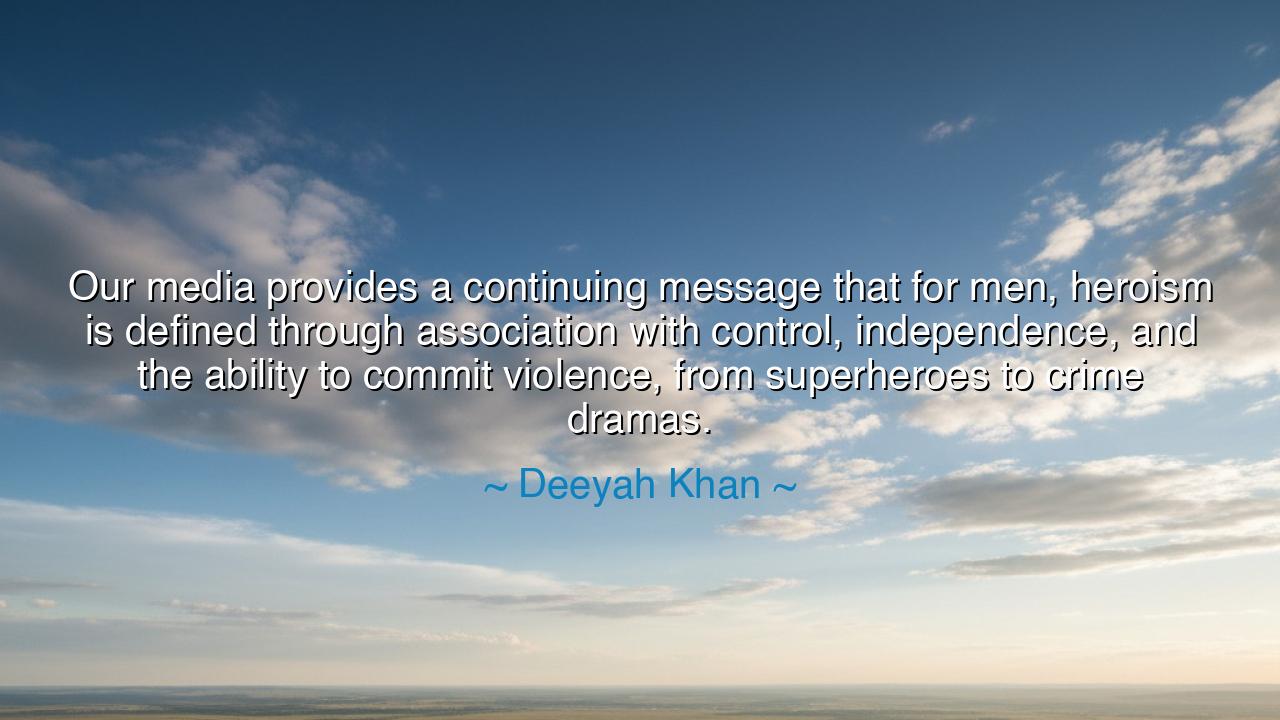
Our media provides a continuing message that for men, heroism is
Our media provides a continuing message that for men, heroism is defined through association with control, independence, and the ability to commit violence, from superheroes to crime dramas.






The words of Deeyah Khan, when she declared, “Our media provides a continuing message that for men, heroism is defined through association with control, independence, and the ability to commit violence, from superheroes to crime dramas,” strike at the very heart of modern mythmaking. In these words, she unveils a truth that many have felt but few have dared to name — that the world’s screens and stories have become the new temples in which our societies teach the young what it means to be a man, a hero, and a human being. Her observation is not a condemnation of strength or courage, but a lament for how those virtues have been shackled to domination and destruction.
For Khan, a filmmaker and human rights activist, speaks not from abstraction but from lived truth. She has spent her life examining how culture molds identity — how media becomes the silent tutor of the soul. She warns that when the tales we tell equate manhood with power, independence with isolation, and heroism with the ability to harm, we imprison both men and women in a cage of expectation. The result is a world where boys are taught to conquer but not to understand, to fight but not to feel, to stand alone but never to stand with others. The stories they absorb, from childhood cartoons to the great spectacles of cinema, become blueprints for their sense of worth — and thus the cycle of control and violence continues, generation after generation.
The ancients knew the power of stories. They understood that the heroic myth was not just entertainment, but moral instruction. Yet their heroes — from Odysseus to Beowulf — were never merely conquerors. They were tested not only in battle, but in heart and mind. Odysseus, after his long journey, learns that victory without wisdom leads only to ruin. Beowulf, though fierce in youth, dies learning that pride and isolation are the undoing of kings. These tales warned their listeners that true heroism lay not in domination, but in balance — between power and humility, between independence and community, between strength and mercy. Deeyah Khan’s lament, then, is not that we tell stories of heroes, but that we have forgotten the deeper lessons those ancient heroes once taught.
In our modern age, however, media has turned the myth into machinery. The superhero stands tall and unbreakable, the detective broods in solitude, the soldier fights until the last breath — yet their power often leaves no room for vulnerability or tenderness. Violence becomes virtue, and empathy becomes weakness. The camera lingers on the explosion, not the reconciliation; on the clenched fist, not the open hand. And so, the message that reaches the hearts of millions is this: that to be heroic is to be unfeeling, to be strong is to dominate, to be free is to stand apart. What began as imagination becomes instruction, shaping how men perceive their worth — and how societies measure it.
Yet even within this age of spectacle, there are flickers of renewal. New voices rise to challenge the old myths — storytellers who redefine what it means to be brave. Consider the film “Schindler’s List”, where the hero, Oskar Schindler, saves lives not through violence, but through compassion and cunning. His courage is moral, not martial. Or think of Mahatma Gandhi, whose defiance of an empire was waged not with sword or gun, but with truth and endurance. He too was a hero, though his weapon was peace. These are the stories that Khan calls us to remember — the ones that remind us that the greatest power is restraint, that the highest form of independence is not to control others, but to control oneself.
Her words also carry a deeper sorrow: that by glorifying control and violence, society denies men the full range of their humanity. The same stories that elevate them also isolate them. When compassion is scorned, men learn to bury their feelings; when vulnerability is mocked, they learn to mask their pain with aggression. Thus, the very ideals that are meant to make them strong become chains that bind them in silence and loneliness. Khan’s wisdom is therefore both cultural and spiritual — a plea to heal the rift within the masculine soul, to restore the sacred harmony between strength and empathy that once defined the truest heroes.
So, O listener, take this teaching to heart. Let your measure of heroism not be the force you wield, but the goodness you protect. Tell your sons and daughters stories that honor courage without cruelty, independence without isolation, power without pride. Celebrate those who build rather than destroy, who guide rather than command, who speak truth rather than impose silence. For it is not violence that defines the noble heart, but the wisdom to master it.
Thus, the teaching of Deeyah Khan endures: that our myths make our men, and our men make our world. If we wish for peace, we must first change the stories we tell about power. The true hero is not the one who conquers through control or fear, but the one who rules himself — whose strength is tempered by compassion, whose independence is born of integrity, and whose courage is measured not in violence, but in love. Let such heroes rise again, in our stories and in our hearts, so that the world may remember what true greatness truly is.






AAdministratorAdministrator
Welcome, honored guests. Please leave a comment, we will respond soon